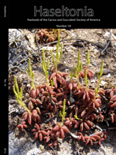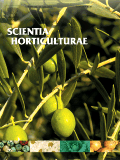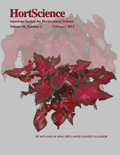
JOURNAL OF THE PROFESSIONAL ASSOCIATION FOR CACTUS DEVELOPMENT
Scope & Guideline
Nurturing Knowledge in Cactus Cultivation
Introduction
Aims and Scopes
- Cactus Agronomy and Cultivation:
Research on the cultivation practices, environmental conditions, and management techniques that enhance the growth, yield, and quality of cactus species, particularly in arid and semi-arid regions. - Morphological and Physiological Studies:
Investigations into the morphological characteristics, physiological responses, and reproductive biology of various cactus species, contributing to the understanding of their adaptation mechanisms. - Phytochemistry and Nutritional Analysis:
Exploration of the chemical composition, nutritional value, and potential health benefits of cacti, including studies on phytochemicals, antioxidants, and other bioactive compounds. - Ecological and Environmental Research:
Studies focused on the ecological roles of cacti in their native habitats, their interactions with other species, and the effects of environmental stressors like water scarcity and salinity. - Biotechnology and Genetic Studies:
Research involving the genetic characterization, molecular techniques, and biotechnological applications such as tissue culture and genetic improvement of cactus species. - Sociocultural and Economic Aspects:
Examination of the cultural significance, economic potential, and market dynamics surrounding cactus cultivation and utilization in different regions.
Trending and Emerging
- Agronanotechnology and Sustainable Practices:
There is a growing interest in agronanotechnology, particularly in how it can be applied to improve cactus cultivation in arid regions. This trend reflects an increasing focus on sustainable agricultural practices that enhance productivity while minimizing environmental impact. - Physiological Responses to Environmental Stress:
Recent studies are increasingly examining how cacti respond to abiotic stressors such as salinity and drought, which is critical given the changing climate and the need for resilient agricultural systems. - Nutritional and Functional Properties of Cacti:
Research on the health benefits, nutritional value, and functional properties of cactus species is on the rise, indicating a growing consumer interest in plant-based diets and natural health products. - Biotechnological Advances in Cactus Research:
There is an emerging trend towards using biotechnological tools for the genetic improvement of cactus species, including studies on tissue culture, genetic transformation, and molecular breeding. - Integrated Management Practices:
An increase in publications focused on integrated management practices for cactus cultivation signifies a shift towards holistic approaches that combine agronomy, ecology, and economics for sustainable production.
Declining or Waning
- Traditional Pest Management Strategies:
Research focused on conventional pest control methods for cacti has diminished, likely due to a shift towards integrated pest management and biological control approaches that are more sustainable and environmentally friendly. - Historical and Cultural Studies of Cacti:
While the cultural significance of cacti remains important, fewer studies are being published that delve into the historical uses and traditional knowledge surrounding cactus species, indicating a shift towards more scientific and applied research. - General Reviews of Cacti:
The journal has seen a decline in broad, non-specific review articles that summarize existing knowledge on cacti, as there is a growing preference for targeted studies with specific research questions and methodologies.
Similar Journals

HORTICULTURAL SCIENCE
Cultivating Knowledge, Growing Innovation.HORTICULTURAL SCIENCE is a premier scholarly journal published by the Czech Academy Agricultural Sciences, focusing on the myriad facets of horticulture, including plant breeding, cultivation techniques, and sustainable practices. With a robust Open Access model established since 2002, it aims to disseminate high-quality research to a global audience, fostering collaboration and innovation within the field. Located in the heart of Prague, Czech Republic, the journal boasts an impressive Q2 ranking in Horticulture as reported in 2023, placing it within the top tier of its discipline. Furthermore, it ranks 52nd out of 115 in the scope of Agricultural and Biological Sciences, reflecting its growing influence and reach in horticultural research. The journal is an essential resource for researchers, professionals, and students alike, aiming to advance knowledge and practices in horticulture through original research articles, reviews, and case studies. With its commitment to academic rigor and relevance, HORTICULTURAL SCIENCE stands as a vital contribution to the ongoing discourse in horticultural studies.

Boletin de la Sociedad Argentina de Botanica
Championing open access to botanical research for all.Boletin de la Sociedad Argentina de Botanica is a prestigious open-access journal dedicated to advancing the field of botany, with a specific focus on plant science and ecological study. Published by the SOC ARGENTINA BOTANICA since 2005 and based in Argentina, this journal is committed to providing a platform for high-quality research that contributes to the understanding of plant biology, evolution, and ecological interactions. With an ISSN of 1851-2372, it features research articles that are accessible to a global audience, thus promoting collaboration and knowledge sharing among scientists, researchers, students, and the broader academic community. Despite being categorized in the fourth quartile for both Ecology, Evolution, Behavior and Systematics and Plant Science as of 2023, the journal serves as an important resource within its niche, offering insights from the Latin American context. Researchers and professionals are encouraged to utilize this journal as a valuable reference in their studies and contributions to the ongoing discourse in botanical science.

HASELTONIA
Nurturing Collaboration in Plant Science ResearchHASELTONIA is a distinguished journal published by the CACTUS SUCCULENT SOC AMER INC, focusing on the field of plant science with particular emphasis on cacti and succulent plants. With an ISSN of 1070-0048 and an E-ISSN of 1938-2898, this journal has carved a niche for itself in the academic community, boasting a 2023 Scopus rank of #204 out of 516 in Agricultural and Biological Sciences, placing it in the 60th percentile. HASELTONIA spans several converged years from 2002 through 2024, reflecting its commitment to publishing pertinent and timely research. This journal is recognized for its significant contribution to the understanding and conservation of succulent flora and is classified in the Q2 category in Plant Science, indicating a solid impact in the field. HASELTONIA aims to promote research collaboration, disseminate innovative findings, and foster knowledge sharing among researchers, professionals, and students alike, making it an essential resource for anyone dedicated to the study and appreciation of plant diversity.

Acta Scientiarum Polonorum-Hortorum Cultus
Advancing Horticultural Innovation and Research.Acta Scientiarum Polonorum-Hortorum Cultus is a notable open-access journal dedicated to the field of horticultural science, published by UNIV LIFE SCIENCES LUBLIN in Poland. Since its inception in 2002, it has aimed to disseminate high-quality research findings, innovative methodologies, and advancements in the horticultural sector. The journal is indexed in Scopus and has ranked in the 33rd percentile for Horticulture and the 25th percentile for Plant Science, indicating its growing influence and relevance within the scientific community. Despite the challenges presented in quartile categorizations, Acta Scientiarum Polonorum maintains a commitment to cultivating knowledge and fostering collaboration among researchers, professionals, and students in the agricultural and biological sciences. With its publication timelines spanning from 2008 to 2024, the journal serves as a vital resource for those interested in the latest horticultural trends, sustainable practices, and scientific inquiries that drive the field forward.

SCIENTIA HORTICULTURAE
Cultivating knowledge, nurturing innovation.SCIENTIA HORTICULTURAE, published by Elsevier, is a leading journal in the field of horticulture, with an impressive impact factor reflected in its Q1 ranking (2023) and position as #6 out of 115 in the Scopus category for Agricultural and Biological Sciences. This journal plays a pivotal role in disseminating cutting-edge research and innovations in horticultural science and technology, contributing significantly to the understanding of plant cultivation, production, and management. With continuous publication since 1973, SCIENTIA HORTICULTURAE offers an essential platform for researchers, professionals, and students alike who are focused on the advancement of sustainable horticultural practices. Although it is not an open-access journal, it provides a wealth of data and findings that can be accessed through institutions and libraries. Located in the Netherlands at RADARWEG 29, 1043 NX AMSTERDAM, this journal remains an invaluable asset to the global horticultural community throughout its converged years, fostering collaboration and elevating standards in horticulture research.

Journal of Berry Research
Harvesting Research for Berry EnthusiastsJournal of Berry Research, published by IOS PRESS, is an essential scholarly platform that addresses a wide array of topics related to the health benefits, cultivation, and innovation surrounding berry species. With an ISSN of 1878-5093 and an E-ISSN of 1878-5123, this journal has successfully carved a niche in various interdisciplinary fields, achieving notable rankings in its respective categories, including Q2 in Agronomy and Crop Science and Q3 in Biochemistry and Food Science as of 2023. The journal not only serves as a repository of rigorous research but also facilitates the exchange of knowledge among researchers, professionals, and students invested in agronomy, horticulture, and plant science. The HIndex reflects its growing impact within these disciplines. Set against the backdrop of the Netherlands since its inception in 2010, the Journal of Berry Research continues to provide cutting-edge insights, making it a pivotal resource for those pursuing advances in berry research and its associated fields.

Horticulture Environment and Biotechnology
Pioneering Research at the Crossroads of Environment and ScienceHorticulture Environment and Biotechnology is a prestigious journal published by the Korean Society of Horticultural Science, dedicated to advancing knowledge in the fields of horticulture, biotechnology, and plant science. Since its inception in 2011, this journal has played a crucial role in disseminating high-quality research, evidenced by its 2023 category quartile rankings, which position it in Q1 for Horticulture and Q2 for Biotechnology and Plant Science. With impressive Scopus rankings, including Rank #18 out of 115 in Horticulture, the journal continues to demonstrate its significance within the academic community by contributing to innovative practices and findings that impact both environmental sustainability and horticultural advancements. Currently, the journal is accessible to a global audience, facilitating the exchange of ideas and research outcomes with no open-access fees. Horticulture Environment and Biotechnology strives to support researchers, professionals, and students alike by providing a platform for critical discussions on the intersection of horticultural science and biotechnology, thereby fostering the development of sustainable agricultural practices that align with contemporary challenges.

Zeitschrift fur Arznei- & Gewurzpflanzen
Bridging Academia and Industry in Plant ResearchZeitschrift für Arznei- & Gewürzpflanzen, published by AGRIMEDIA GMBH in Germany, serves as a vital platform for the dissemination of research in the fields of agronomy, food science, and plant science. With an ISSN of 1431-9292, this journal focuses on the study and application of medicinal and aromatic plants, making significant contributions to both academia and industry. Although it is classified in Q4 quartiles across its relevant fields for 2023 and has a Scopus ranking that places it in the lower percentiles, the journal offers a crucial resource for understanding the ongoing developments and research challenges in herbal medicine and crop enhancement. It aims to provide a comprehensive view on various aspects of herbal studies, including cultivation, pharmacological properties, and their implications for food science, thus appealing to researchers, professionals, and students involved in plant research, agriculture, and nutrition. For access information, please refer to the journal's official web portal for details on subscription and submission guidelines.

Journal of Horticultural Sciences
Cultivating Knowledge, Nurturing Growth.The Journal of Horticultural Sciences, published by the Society for Promotion of Horticulture (SPH) in India, serves as a vital platform for the dissemination of research in horticulture and related fields. With an ISSN of 0973-354X and an E-ISSN of 2582-4899, this open-access journal has been committed to advancing horticultural knowledge since 2006, allowing researchers to share their findings widely and facilitate significant advancements in the discipline. The journal's influence is reflected in its current category quartile rankings, designated as Q4 in Ecology, Evolution, Behavior and Systematics, Horticulture, and Plant Science for 2023, illustrating its developing reputation within the academic community. It is important to note the journal's Scopus ranking in the field, where it ranks #111 in Horticulture and #709 in Ecology, marking it as a niche publication with potential for growth. As it converges years from 2019 to 2024, this journal aims to further engage scholars, professionals, and students by focusing on innovative research and breakthroughs in horticultural sciences, thus contributing to the global discourse in sustainable agriculture and environmental stewardship.

HORTSCIENCE
Cultivating innovation in horticultural science.HORTSCIENCE is a prestigious journal published by the American Society for Horticultural Science, focusing on the latest research and developments in the field of horticulture. With an ISSN of 0018-5345 and an E-ISSN of 2327-9834, this journal has established itself as a vital resource for horticultural scientists, practitioners, and educators since its inception. As of 2020, it has embraced an Open Access model, promoting the dissemination of scientific knowledge and enabling wider accessibility to its rich content. HORTSCIENCE currently holds a Q2 ranking in the Horticulture category for 2023, placing it in the top tier of its field with a Scopus rank of 36 out of 115 in the area of Agricultural and Biological Sciences. This journal publishes empirical research, significant advancements, and comprehensive reviews that contribute to the understanding and improvement of horticultural practices, making it an essential publication for anyone involved in horticultural research or education.